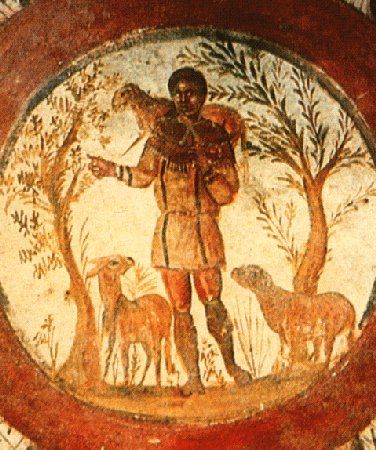My partner, Rosean, who is a deacon in the Ecumenical Catholic Church, is taking a class on Midrash at one of the local synagogues. She is the only non-Jewish member. Imagine her delight when she saw that two fellow guests at our New Years Eve dinner were her classmates.
In our conversation over our meal, our host, a Christian chaplain, was lamenting that some people who work with her at her hospice have no training. They have not taken a CPE course nor studied at a seminary. Of one fellow she said, “All he has is a tie that says, ‘Jesus saves.’” Having been raised by enthusiasts like him, I groaned loudly.
One of the Jewish women asked, provocatively, “Well, doesn’t he?”
“It depends on what you mean by ‘saves’,” I replied. And that was as far as we got down that trail.
When Jesus, in today’s passage, says, “I am the gate,” does he mean that he is the only avenue through which one can know God? Many Christians believe so. And, quite rightly, this is a terrible affront to our Jewish neighbors.
But, if being “the gate” does not mean that Jesus is the exclusive way-in to relationship with God, what does it mean? My current understanding is still fraught with problems. Richard Rohr calls Christ-the-gate the Cosmic Christ. Being the gate is a function of this Second Person of the Trinity, for it is the human-God interface. In whatever language and with whatever notions we pray, there is a gateway. It makes sense to me that God meets us there because God is, in one aspect, also human.
It’s probably a good thing that my new Jewish friends did not press me further on what I mean by being ‘saved.’ The Incarnation is still a blasphemous concept to them. God is not a trinity but a unity, and they would find it condescending of me to say that their gateway to God is through this cosmic function that I call Christ.
And my Christian brothers and sisters might also find my concepts problematic. Is it truly possible to divorce Jesus-the-man this far from Christ-the-gate? When push comes to shove, do I even do that?
Better, probably, to talk about my practice than about my concepts. I pray. The understanding that I have received through pondering parables, signs and stories from the Gospels shapes to whom I pray and what I feel comfortable in saying and asking. I come vulnerable, devastatingly honest in who I perceive myself to be. I bring my sadness and guilt at where I have failed, my anguish over the suffering of my fellow humans, my hopes for strength and encouragement, my gratitude, and all my other feelings, needs and postures. I talk to God, then I hang out with God. Christ is my gate.
Laurie Gudim is a religious iconographer and writer living in Fort Collins Colorado. You can learn more about her and see some of her work at everydaymysteries.com.

